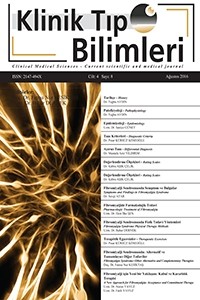Üçüncü Basamak Bir Kamu Hastanesinde Bir Yıllık Rapid PlasmaReagin (RPR) ve Treponema Pallidum Hemaglutinasyon Assay (TPHA) Sonuçlarının Değerlendirilmesi
ÖzAmaç: Sifiliz sadece insanda patojen olan Treponema pallidum’un neden olduğu sistemik bir hastalıktır. Hastalığın tanısında sıklıkla serolojik testler kullanılır. Serolojik tanıda esas olan nontreponemal testlerle yapılan tarama ve ardından sonucun treponemaltestlerle doğrulanmasıdır. Nontreponemal testlerden Rapid Plasma Reagin (RPR) günümüzde tarama amacıyla yaygın olarak kullanılmaktadır. Treponemal testlerden Treponema Pallidum Hemaglutinasyon Assay (TPHA) kullanılmaktadır. Bu çalışmada üçüncü basamak bir kamu hastanesinde bir yıllık RPR ve TPHA test sonuçlarının retrospektif olarak değerlendirilmesi amaçlanmıştır. Materyal Metod: Bu çalışmada, 01.01-31.12 2017 yılları arasında İzmir Sağlık Bilimleri Üniversitesi İzmir Tepecik Eğitim ve Araştırma Hastanesi Seroloji Laboratuvarı’n asifiliz tanı ve takibi amacıyla gönderilen toplam 3854 serum örneği değerlendirilmiştir. Serum örnekleri günlük çalşılmıştır. Serumlarda RPR (Plasmatec,UK) ve TPHA (Omega Diagnostic, İngiltere) testleri, üretici firmaların önerileri doğrultusunda çalışılmıştır. Bulgular: Bir yıllık süre içinde 3187 (%83) hastanın serum örneğinde RPR testi negatif saptanmıştır. 616 (%16) hastada RPR ve TPHA negatif, 36 (%0.9) hastada RPR veTPHA pozitif saptanmıştır. Bu 36 hastanın 8’i (%0.2) HIV pozitiftir. Hastaların 15’in-de (%0.4) RPR negatif, TPHA pozitif saptanmıştır.Sonuç: Sifiliz tedavi edilmediğinde kronikleşebilen bir hastalıktır. Doğru seçilecek testler ile hızlı tanı konması önemlidir. Treponemal ve nontreponemal testlerden yalnız tek birinin kullanılması tanıda yetersiz kalmaktadır. Her iki grup tastin hastalığın tanısında kullanılması önerilmektedir.
Anahtar Kelimeler:
RPR, Sifiliz, TPHA, Treponema pallidum
Assessment of One Year Rapid Plasma Reagin (RPR) and Treponema Pallidum Hemagglutination Assay (TPHA) Results in a Third Stage Public Hospital
Abstract Aim: Syphilis is a systemic disease caused by Trepanema pallidum, which is onlyan inperson pathogen. Serologic tests are frequently used in diagnosis of the disease. Screening with nontreponemal tests, which is essential forserologic diagnosis, and subsequent confirmation with treponemal tests. Rapid Plasma Reagin (RPR) from nontreponemal tests is now widely used for screening. Treponemapallidum hemagglutination assays (TPHA) are used for treponemal tests.In this study, it was aimed to retrospectively evaluate oneyear RPR and TPHA test results in a tertiary public hospital.Materials and Methods:In this study, a total of 3854serum samples sent to İzmir Health Sciences University İzmir Tepecik Training and Research Hospital Serology Laboratory between 01.01-31.12.2017 for the diagnosis and follow-up of syphilis were evaluated. Serum samples wererun daily. Serum RPR (Plasmatec, UK) and TPHA (Omega Diagnostic, UK) tests were conducted in line with the recommendations of the manufacturer.Results: The RPR test was negative in serum samplesof 3187 (83%) patients over a one-year period. 616 (16%)patients were RPR and TPHA negative, and 36 (0.9%) wereRPR and TPHA positive. Eight of these 36 patients (0.2%)were HIV positive. In 15 patients (0.4%) RPR was negative and TPHA was positive.Conclusion: Syphilis is a chronic disease when not treated. It was important to diagnose quickly with the right choice of tests. The use of only one of the treponemal and non-treponemal tests is insufficient to diagnose. Both groups aresuggested to be used in the diagnosis of tastin disease
Keywords:
RPR, Syphilis, TPHA, Treponema pallidum,
___
- Kaynaklar 1. Pope V, Norris SJ, Johnson RE (Çev. Öğünç D). Treponema ve in-san ilişkili diğer spiroketler, s: 987-1003. Murray PR, Baron EJ, Jor-gensen JH, Landry ML, Pfaller MA (eds), Klinik Mikrobiyoloji (Ma-nual of Clinical Microbiology. American Society of Microbiology).2009, 9. Baskı. Atlas Kitapçılık, Ankara. 2. Orton S. Syphilis and blood donors: what we know, what we don’t know,and what we need to know. Transfus Med Rev 2001; 15: 282-92. 3. Egglestone SI, Turner AJ. Serological diagnosis of syphilis. PHLS Syphi-lis Working Group. Commun Dis Public Health 2000; 3: 158-62. 4. Aktaş G. Sifilizin serolojik tanısı. Türk Mikrobiyoloji Cem Derg 2005;35: 73-9. 5. Goh BT, van Voorst Vader PC. European guideline for the manage-ment of syphilis. Int J STD AIDS 2001; 12(Suppl): 14-26. 6. Larsen SA, Steiner BM, Rudolph AH. Laboratory diagnosis and in-terpretation of tests for syphilis. Clin Microbiol Rev 1995; 8: 1-21. 7. C. Sönmez., Sifiliz Serolojik Tanısı. Türk Mikrobiyol Cem Derg 2018;48(1): 72-77. 8. Altunay H. Nükleik asit amplifikasyon testleri (NAT). In: Saltoğlu N,Sakarya S, eds. 14. Türk Klinik Mikrobiyoloji ve Enfeksiyon Hasta-lıkları Kongresi (KLİMİK) Kitabı; 25-29 Mart 2009; Antalya: Tür-kiye 2009, sayfa 23. 9. Mollah AH, Siddiqui MA, Anwar KS, Rabbi FJ, Tahera Y, Hassan MS,Nahar N: Seroprevalence of common transfusion-transmitted infec-tions among blood donors in Bangladesh. Public Health, 2004; 118:299-302. 10. Willand L, Ritter S, Reinhard B, Offergeld R, Hamouda O. HIV, HCV,HBV and syphilis infections among blood donors in Germany. Re-port from the Robert Koch Institute in accordance with Article 22 ofthe Transfusion Act. Bundesgesundheitsblatt GesundheitsforschungGesundheitsschutz, 2008; 51(8):902-14.
- ISSN: 2147-494X
- Başlangıç: 2013
- Yayıncı: Selen Medya Yayıncılık Tanıtım ve Organizasyon Hizmetleri
